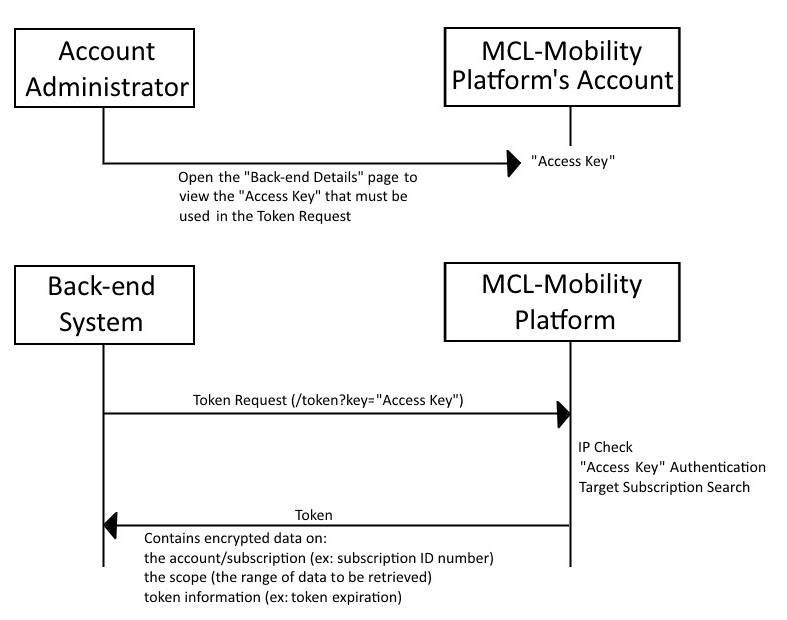Back-end Services
Overview
A back-end is an external system that communicates/exchanges data with your MCL-Mobility Platform account.
This data exchange is possible due to specific back-end services such as the "Reporting Service", which are provided by MCL-Mobility Platform. See Reporting Service.
The access from the external system is based on token authentication/authorization and the communication itself is based on web service requests. It implies the use of back-end profiles within your account (managed in the "Back-ends" module - see Back-ends) and an MCL-Mobility Platform subscription that includes back-end services.
The use of back-ends within your account requires the following steps:
1. Make sure your MCL-Mobility Platform subscription includes the necessary back-end service(s) - ex: "Reporting service".
2. Create a back-end profile for the external system you intend to use in the "Back-ends" module. This triggers MCL-Mobility Platform's identification of the external system as a back-end that is authorized to communicate with your account. For instance, once the back-end profile is created, you are provided with the access key that is necessary for a token request.
Access Key - a string of data that identifies a specific back-end and is automatically generated in the back-end's profile. Check the "Back-end Details" page for for the access key. See Back-end Details.
3. Include the access key in the back-end's token request to MCL-Mobility Platform. See Token Request Sequence below.
4. Use the resulting token provided by MCL-Mobility Platform in the data exchanges between the back-end and your MCL-Mobility Platform account.
There are two types of tokens that can be used by the back-end to communicate with your MCL-Mobility Platform account:
Token - a standard access token that is valid for 60 minutes (the count starts from the moment that the token is sent to the back-end). The token is provided by MCL-Mobility Platform after the authentication/authorization of a back-end's token request with the corresponding access key. It cannot be deactivated. If the back-end wants to request a new token, it is not necessary to wait for the current token to expire.
In terms of security, it is the recommended token type because of its time limit.
Static Token - a token that does not expire (which makes it less secure). If required, it can be manually deactivated but the deactivation can take up to 60 minutes to validate.
The static token is unique to each back-end and it is generated in the back-end's corresponding "Back-end Details" page. See To Generate a Static Token.
Unlike the standard token, the use of a static token forgoes a token request, meaning, the back-end does NOT have to communicate with the MCL-Mobility Platform to get a token. The static token is immediately generated in the back-end profile's page and is ready to be used in a web service request.
The use of a standard token (in a back-end request) requires a previous token request by the back-end to the MCL-Mobility Platform.
The token request's success relies on the MCL-Mobility Platform being able to authenticate the access key contained in the request.
The diagram below illustrates the steps involved in obtaining a standard token so the back-end can communicate with your MCL-Mobility Platform account.

The above described token request sequence does NOT apply when the back-end system uses a static token.
For more detailed and technical information on token requests, check the available documentation for download ("reporting-doc.txt") in a back-end profile's "Back-end Details" page - "Services" tab.